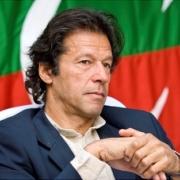Eye on Ivy Editorial Writing Contest Winner: Class A
Below is the editorial that earned top honors in the first Quill and Scroll Editorial Writing Contest for Pakistani students, Class A, which included students in grades 9 and 10, co-sponsored by Eye on Ivy. The contest prompt asked students to examine various ways to protect themselves from misinformation on social media, as well as how these platforms affect current events.
Social media use has increased among Pakistani youth. What is the impact of this increase on current events and how can Pakistani youth protect themselves against misinformation?
By Zayna Ahsan
Just yesterday, the whispers spread like wildfire across the classroom. One second, we were sitting quietly solving a worksheet of quadratic equations, and the next, a crisis was born out of nowhere. Another teacher rushed in, panic-stricken while my class fellows’ phones rang non-stop.
“Imran Khan (the former Prime Minister) has been shot! The city is being locked down, and people are on the streets!”
I felt fear settling into my chest at the thought of not being able to get home and my family being in danger. My peers were rushing from the campus in big groups. Immediately, I checked in on my parents only to hear from them that the roads were perfectly clear.
Still afraid of how the situation would escalate, I took an alternative way home, far from the main roads. A few hours later, I would find out that Imran Khan was shot in his leg, it happened 570 kilometers away from my city, that he was alive and well, and no lockdowns were taking place.
In these times of instability, the mix of social media news with a young and enthusiastic generation, keep adding fuel to the fire. Where social media has pushed the youth to be more politically active and aware, it has also bred a home ground for constant information overload, creating feelings of panic, fear, and conflict. Post quarantine, we only see this issue getting worse.
81% of students at the International Islamic University of Islamabad said they spent their free time on social media apps. This case is applicable all across Pakistan. More and more people rely on social media for their news which is having a negative impact. “Vile content was, and still is, posted as audience opinions, just below main news. Lies, aspersions, and a host of inaccuracies still creep in, despite filters, algorithms, and pretensions of control,” stated best by the writers at Dawn News.
People get bombarded with information every day on social media and form their opinions accordingly. Firstly, there is no check at the initial level that the information being shared is credible. This spreads misinformation, and the chain reaction occurs as mentioned previously continues. The speed of information spread is too fast for even an individual to evaluate or check. Secondly, most information is put out with a specific narrative which will inevitably have an effect on the opinions that people form. All information posted and exchanged has statements alongside the facts. The free speech movement of social media has led people to ensure they voice their opinions on all current events, which further influences others’ opinions and so on. Therefore, this problem is two-pronged, the youth is either consuming inaccurate information or biased information.
Using Michel Foucault’s theory of power and knowledge, let’s discuss the practical impact of this issue on current events. As he suggests, power moves in all directions to benefit the ruler. Power wants the knowledge and information to be known to further categorize it and use it to further institutionalize the masses. Knowledge is subject to power.
This groundbreaking thought applies to the use and over-availability of social media to the youth. The youth and their data are the product of all power institutes. This gets manipulated to the advantage of the benefiting party. In the case of yesterday’s incident, as mentioned earlier, the spread of chaos and fear benefitted the movement of our former PM. The process of control through knowledge mentioned by Foucault now takes place in a matter of minutes, on account of social media.
The question to be answered is, how can this be dealt with? Pakistan has a few organizations taking steps to combat misinformation, such as the Digital Research Foundation (DRF) and the Media Matters for Democracy (MMfD). These are taking steps in the right direction but the efforts need to be much more widespread and frequent.
According to a survey by DRF, 88.7% of journalists deemed Whatsapp and Twitter as the biggest causes of misinformation. These platforms must take more accountability and set restrictions for what topics can be posted about on social media, and who can post it while maintaining a healthy sense of free speech. AFP fact-checking initiatives, supported by Facebook are a good example to look at for this solution. They investigate flagged stories and put warnings next to information that is inaccurate.
Moving on to what young social media users can do, there are multiple ways to filter information and become educated in a responsible manner. First and foremost, they can support fact-checking initiatives taken on these platforms by reporting information they find doubtful or flagging something considered propaganda. Making individual change takes a great degree of effort but must be done. Qualitative, credible sources should be preferred to a vast quantity of anonymous sources. Moreover, sources that are transparent about the verification method will not fail the reader.
The increase in social media usage among Pakistani youth is no longer just a technological problem; it is now directly linked to the political, economic, and social framework of our society. I would like to leave you all with this quote by Tom Rosenstiel, “Misinformation is not like a plumbing problem that can be fixed. It is a social condition, like crime, that one must constantly monitor and adjust to.”

 Wikimedia photo from Jawad Zakariya via Flickr
Wikimedia photo from Jawad Zakariya via Flickr
Leave a Reply
Want to join the discussion?Feel free to contribute!